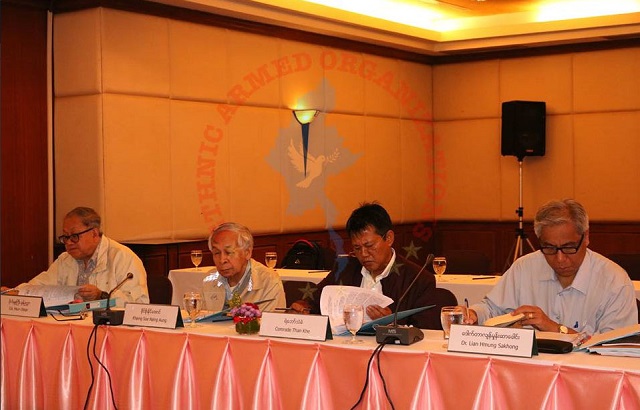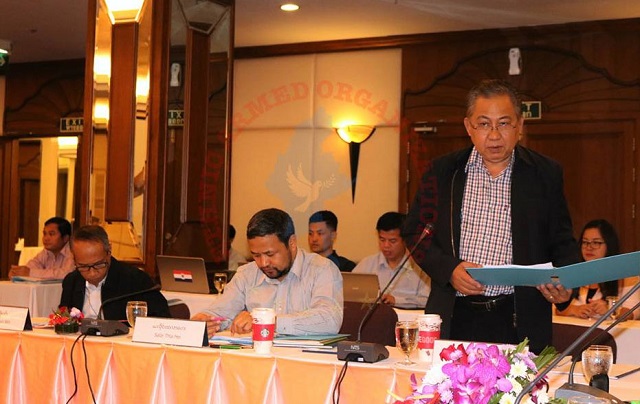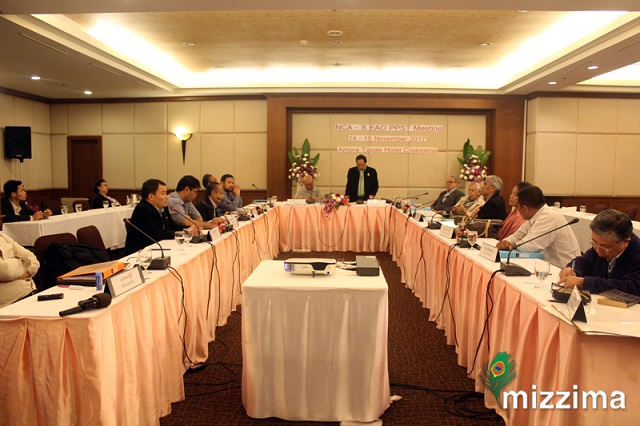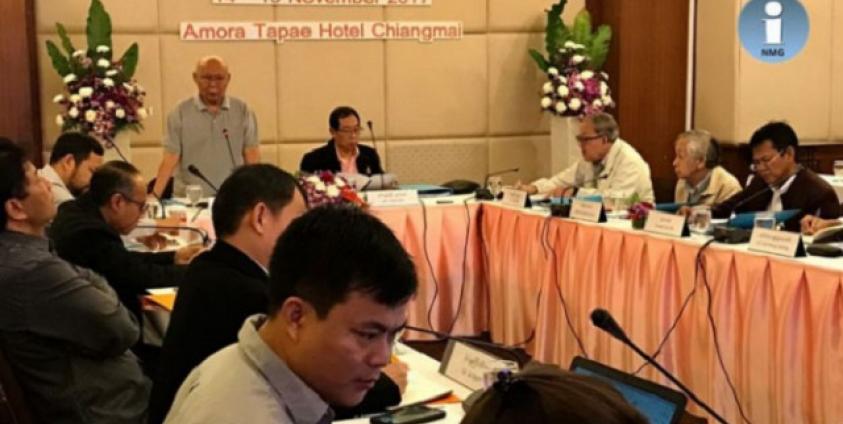In that I learn from him.
Ralph Waldo Emerson (1803-1882)
The meeting is the first since 9-10 October 2017 which was held in preparation for the ceremony to be held in Naypyitaw on 15 October 2017 in commemoration of the NCA signing two years earlier.
Following the ceremony, the signatory negotiators had conducted a series of meetings with the government-Tatmadaw side:
16 October – Informal with Tatmadaw Commander in Chief and the State Counselor
25-26 October – Joint review of NCA Implementation
28-29 October – UPDJC Working Committee
30-31 October – UPDJC
The 16th PPST meeting was held, as I see it, for 3 Rs:
- To report (what took place at the latest negotiations)
- To review the reports
- To revise the PPST plan based on the review
Day One. Tuesday, 14 November 2017
International law recognizes the claim to self-determination only in cases of colonialism, foreign invasion or gross discrimination and abuse of human rights.
The Economist, 23 September 2017
The meeting is opened by Gen Mutu Saypoe, leader of the PPST at 09:15. The draft agenda is then read out, revised and approved by the meeting.
The first item is about the informal meeting between the PPST and the Tatmadaw CinC and later the State Counselor on 16 October.
This is the first time the author has received the firsthand account by one leader who was there. (What was written in the journal To Hopeland and Back: The 33rd trip came from media reports.
- He supported the holding of JICM (Joint Implementation Coordination Meeting)
- He also supported the holding of NCA implementation reviews. He however warns against rewording of the text.
N.B The PPST has not proposed the revision of the text. But it wants to be sure every term (and phrase) there is interpreted one and the same by both sides
- He did not want (sub) national dialogues—NDs—to be held nationwide. He preferred limited NDs.
Meeting with State Counselor
- She agreed the holding of JICM as soon as possible. But she appeared to have reservations about its ToR. For instance, whether it should be held every 3 months or only when it is deemed necessary.
- She seems to be more all-out on the UPDJC where she is its chair
- She stressed the importance of reaching agreement on common federal principles before the end of her tenure (one non-PPST participant says he believes she meant “before the end of 2018”)
Commenting on this, a PPST member says:
“Time is on the Tatmadaw’s side. While the State Counselor wants the Pyidaungsu Accord (Union Accord) to be signed before the next elections in 2020, the Tatmadaw can afford to wait. Also it is riding high on popular support over the Rakhine crisis to care much about non-Burmans.”
The next item is on the NCA implementation review:
- The signatories had presented a 21 point proposal. The result was both sides would submit it to their respective leaderships for approval.
- The EAO negotiators are confident they have no problem dealing with their counterparts on most of the points, but on 7 of them, they need the PPST’s guidance. For instance, the holding of NDs where the Tatmadaw is adamant they should not be held outside the EAOs’ controlled areas.
On the UPDJC meeting
- Both sides agreed that at the next Union Peace Conference (UPC), or as preferred by the government, the 21st Century Panglong (21 CP), No.1 priority should be given to the political sector
- One question we should keep in mind is whether the 8 signatories should work out the common federal principles just by themselves, but in consultation with non-signatories.
- Another persisting problem is the revision of the Framework for Political Dialogue (FPD) has yet to be finished, as all have been waiting for the UNFC (United Nationalities Federal Council) to sign the NCA
- The EAO negotiators were well prepared. And they had the support of the ethnic political parties. Still the negotiation was tough, as the other side was sticking to their guns
On the JMC meetings
- One agreement we had reached last year was to hold a review of the ToR (Terms of Reference). The matter should be broached at the next JMC-U meeting (JMC-U # 13, 20-22 November)
- The Tatmadaw is still insisting that where there is no fighting, there should be no JMC-S (State level). So we have yet to set up JMC-Ss for Rakhine and Chin states.
- The planned demarcation task will be handled by the Tatmadaw and EAOs concerned The JMC-Ss will be facilitators.
- On the involvement of the international community, we are in great need of their technical assistance and counsel
On “ungentlemanly” diplomacy
- We see rising obduracy on the part of the government, notably by its armed wing. During the previous government’s tenure, either U Aung Min or his boss U Thein Sein were able to mediate between us. The State Counselor, in comparison, is at a loss what to do about it
- One military negotiator is extremely ungentlemanly, almost to the point of saying the way to peace is to submit to the military’s wishes and demands
- I’m afraid if we are going to yield to their conditions, the results will be “a negotiated surrender,” not a “negotiated solution,” says one negotiator
- Our policy is to be neutral between the government and the Tatmadaw. But there is a question: should we be cool to both or be warm to both?
The day ends with news from the UNFC meeting held at another hotel.
The meeting decides not to succumb to the military’s stand on its remaining Point#2 proposal that the union should be a federal democracy.
The military meanwhile maintains that nothing should override the NCA’s Paragraph 1 (a):
Establish a union based on the principles of democracy and federalism in accordance with the outcomes of political dialogue and in the spirit of Panglong, that fully guarantees democratic rights, national equality and the right to self-determination on the basis of liberty, equality and justice while upholding the principles of non-disintegration of the union, non-disintegration of national solidarity and perpetuation of national sovereignly.
The NCA became a law after it was adopted without objection by the union parliament on 8 December 2015, almost 2 months after its signing.
But accusations appear to be unavoidable. One UNFC member, upon my inquiry, says:
In March, we had reached ‘agreement on principle’ in all the 8 points. But in April, some points had to be re-negotiated and a military delegate accused us of ‘moving the goalposts (so the footballer cannot score a goal)’. Now it seems they are doing what they have been accusing us all along. During the 7th meeting, we had agreed on all points except Point #5. At the 8th meeting, we were able to reach agreement on it. But then the military came up with its opposition to Point #2, to which it had no objection during the 7th meeting.
I leave it to the reader to dig in further and make up his/her own mind.
Day Two. Wednesday, 15 November 2017
Democracy requires consensus as well as the rule of law. Constitutional change, especially the right to break away, should be difficult — but not impossible.
The Economist, 23 September 2017
I have nothing much to say about the proceedings of the meeting today, except that, as seen again and again, some topics, which we consider are going to be tough nuts to crack, do not in fact take much time to reach decisions, but others that we regard as easy ones, take longer.
However, one item that cannot be left out is on the UNFC that is due to hold the 9th round of negotiations with the government tomorrow.
Here are selected excerpts from the meeting’s discussions:
- If we are going to meet the UNFC, they want us to inform them at least 2-3 days in advance, so they can adjust their schedules in time.
- They also want to know whether we have a PPST policy toward the UNFC. So far, they’ve been hearing different policies from different PPST members.
- I told them “Federal Democracy” and “Union based on democracy and federal principles” are just words written on paper. Because in reality, signing on Federal Democracy won’t just end there. We still have to negotiate long and hard to achieve what we want.
- If they are going to sign the NCA, we should help them to do it in dignity

PPST member at the meeting: (left to right) Hkun Okker, Khaing Soe Naing Aung, Comrade Than Khe, and Dr Lian Hmung Sakhong (who came in Pu Zing Cung’s stead) (Photo: EAO)
By the end of the day, a 15 point resolution was reached by the meeting. Here are some of them:
- To hold a grand opening for the EAO office which has been relocated near the NRPC on the U Wisara Road on 18 November
- To continue the NCA implementation review until common understanding is reached
- To reach agreement on 9 common federal principles in the upcoming UPC 21 CP
(They are:
- Basic political principles for establishing a union based on democracy and federalism
- Sovereignty
- National equality
- Right of Self Determination for federal units
- Form of Union and organization of federal units
- Division of power between Union and States
- The right to have state constitutions
- Protection of minority rights
- Establishment of state police forces)

Comrade Myo Win, Salai Thla Hei and Saw Kwe Htoo Win, coordinators for the meeting (Photo: EAO)
- Dr Lian Hmung Sakhong is appointed Vice Chair (Deputy to the State Counselor who is chair) of the UPDJC in place of Saw Kwe Htoo Win, who will join the JICM
- The UNFC is encouraged to sign the NCA
- NCA witness signatories should be approached in order to procure their assistance in the PPST’s quest for peace and a federal union (The witness signatories are: UN, EU, China, Japan, Thailand and India)
- The PPST will continue to struggle for the achievement of principles stated in NCA paragraph 1 (a)
The closing remarks were delivered by Gen Yawd Serk:

Gen Yawd Serk delivering closing speech (Photo: Mizzima)
The aim of our struggle is three-fold:
- To achieve a federal system of government
- To achieve the right of self determination
- To achieve peace
The other side may want a win-lose solution. But we will try our best to convince them that a win-win solution is the best for all
I urge all of us to be patient, calm and united in order to achieve our aims
It is already 18:40 when it ends.
Then comes the news from Yangon:
The scheduled 9th meeting between the DPN and PC tomorrow is postponed.
Instead the two sides will meet informally in order to find ways and means to reach agreement.
I hope they find it.







